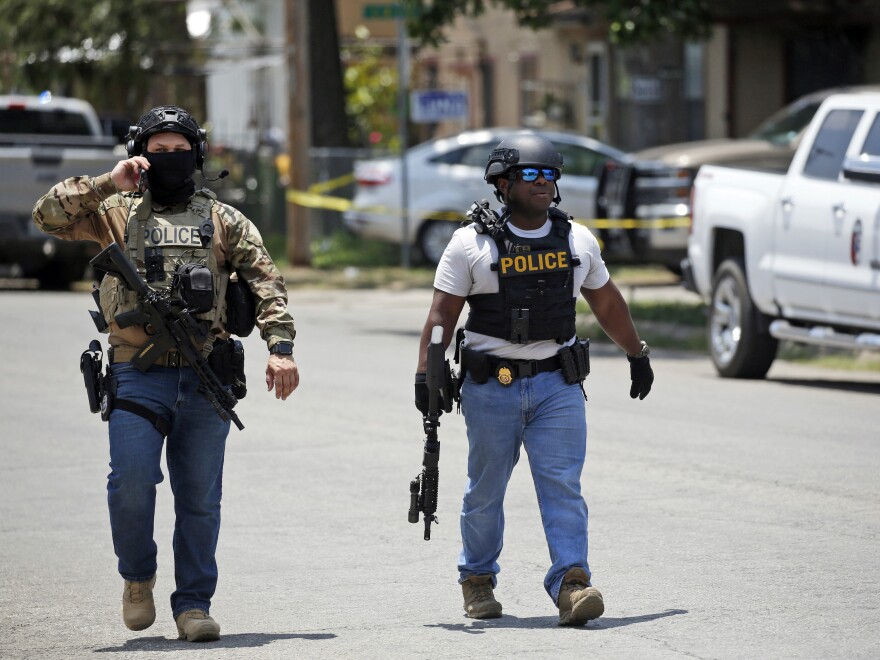Every day, new information surfaces about how law enforcement responded to the mass shooting at Robb Elementary School in Uvalde, Texas, that left 19 students and two teachers dead.
Critics have pointed out failures at nearly every step of that response: the school's resource officer drove by the shooter as he crouched between cars; police waited more than an hour to head into the classroom while the gunman was inside; and the chief of school police showed up without his radio and stopped treating the incident as an active shooter situation.
Katherine Schweit is a former FBI special agent, and created the agency's active shooter program after the shootings at Sandy Hook Elementary School in 2012. She's also the author of the book Stop The Killing: How To End The Mass Shooting Crisis. She joined NPR's All Things Considered to give her perspective on the law enforcement response in Uvalde, and share strategies for students and teachers to better their odds of surviving a mass shooting.
This interview has been lightly edited for length and clarity.
Interview highlights
On her reaction to how police on the scene reacted:
You know, I'm going to tell you the truth. I was shocked. I was shocked. And at first, it was disbelief. I was like, they can't possibly have had this situation happen there. They're not the first law enforcement community that has had some trip-ups and some challenges in responding to things since I've been working on this. But this was just so there, so challenging to see it unfold and right in front of our eyes. That the law enforcement was there for an hour on the other side of a wall is just unheard of. I couldn't have written this if I'd written a script. People would have said they wouldn't believe it.
On what an ideal response would have been according to the active shooter program she designed:
Let me qualify a little bit and just say, the law enforcement training that the FBI is pushing out and has pushed out for years requires that when there is active shooting underway, even if it's a single officer, you must pursue to the sound of the shooting or where you believe the shooter is. You must pursue all the way to the shooter and neutralize the shooter. That is the lone objective, and that — you should never waver from that.
A law enforcement officer, if they're trained, should continue moving forward, even if it means busting through a door, shooting through a door. I recognize the risks that are going through their heads, 'oh, my gosh, there's children in that classroom. I don't want to hurt a child. I don't want to' — but we need to pursue, pursue, pursue, because the shooters have already proven that they're willing to kill people, and they'll continue doing it. That's why the priority is, you keep moving forward, even if it means you go through walls and if you go through windows and if you go through doors.
On a why she says we need to train children to flee first rather than hide:
When I was working with then-Vice President Biden's team after the Sandy Hook shooting to look for solutions, one of the decisions that we made as a group - all the federal agencies said, 'run, hide, fight' is what people do in a shooting. And 'run, hide, fight' teaches us to do the 'run' part first. What we're teaching kids in school is the 'hide' part, but we're not teaching the 'run' part. We don't do that anyplace else in society. We don't tell kids in a mall, 'OK, just hide. Whatever's going on, hide under the bench at the Starbucks kiosk.' So somehow, when it comes to schools, we missed an opportunity to teach children and teach adults in schools that they need to run. That's the first thing they need to do. They need to escape.
If it's your only response, then, you know, your next response should be to fight. Fight the shooter as long and hard as you can. I know so many heroic stories about people who fought or ran. There were little kids who escaped from the Sandy Hook Elementary School because their teacher stepped up, stood in the way of the shooter, and they escaped out a side door. And the FBI, even just in recent years, released new training that says escape. Your first priority has to be to escape. You just can't be killed if you're not there.
On what she has told her own daughter, a grade school teacher:
I do talk to her about these kinds of things all the time because she's my baby. I'm always going to be worried about her. And if I can empower her with a conversation - and that includes letting her kids run out of her school room, even if the district doesn't teach that. One thing that I think that people don't recognize is how much control they have. They have so much control. Find out what your school is teaching. Talk to your kids about what they're learning. Talk to them about their safety. You talk to them about stranger danger and stop, drop and roll. And you don't talk to them about their own safety in a country right now where we're dealing with gun violence. You should.
Copyright 2022 NPR. To see more, visit https://www.npr.org.






